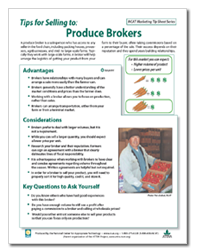Tips for Selling to Produce Brokers
NCAT Marketing Tipsheet Series
By Marisa Alcorta, Rex Dufour, and Tammy Hinman, NCAT
A produce broker is a salesperson who has access to any seller in the food chain, including packing houses, processors, agribusinesses, and mid- to large-scale farms. Typically they work with large-scale farms. A broker will help arrange the logistics of getting your product from your farm to their buyer, often taking commissions based on a percentage of the sale. Their success depends on their reputation and they spend years building relationships.
For this market you can expect:
- Higher volume of product
- Lower prices per unit
Advantages
- Brokers have relationships with many buyers and can arrange a sale more easily than the farmer can.
- Brokers generally have a better understanding of the market conditions and prices than the farmer does.
- Working with a broker allows you to focus on production, rather than sales.
- Brokers can arrange transportation, either from your farm or from a terminal market.
Considerations
- Brokers prefer to deal with larger volumes, but it is not a requirement.
- While you can sell a larger quantity, you should expect a lower price per unit.
- Research your broker and their reputation. Farmers can sign an agreement with a broker that clearly delineates lines of fiscal responsibility.
- It is advantageous when working with brokers to have clear and concise agreements regarding volume throughout the season. Written agreements are helpful but not required.
- In order for a broker to sell your product, you will need to properly sort it for high quality, cool it, and store it.
Tips for Selling to Produce Distributors
Check with other growers and get a sense of the broker’s or the brokerage company’s reputation before you work with them. You want someone with an excellent track record who comes highly recommended. You can check their credibility through their DUNS number or through the Blue Book. There may be a fee for credit-check services.
Written contracts are preferred, but not standard. However, it’s always a good idea to have some type of written agreement with the broker outlining price, volume, time period, and whether the broker is purchasing the product from you or only negotiating a sale. These documents are critical to protecting both parties if anything goes wrong.
Key Questions to Ask Yourself
- Do you know others who have had good experiences with this broker?
- Do you have enough volume to still see a profit after paying a commission to a broker and selling at wholesale prices?
- Would you rather entrust someone else to sell your products so that you can focus only on production?
Resources
The Packer is a weekly newspaper covering fruit and vegetable news, produce shipping, distribution, packing, marketing, and trends in fresh produce in North America.
Wholesale Success: A Farmers Guide to Selling, Post Harvest Handling, and Packing Produce is a 255-page manual about the wholesale produce industry, with details on building relationships, food safety, grading standards, filling orders, record keeping, and billing. The manual includes harvesting, cooling, storing, and packing information for 103 different fruits and vegetables.
AMS Fresh Fruit, Vegetable, Nut, and Specialty Crop Grade Standards lists the U.S. Agricultural Marketing Service grade (quality) standards for each fruit, vegetable and nut sold as commodities.
Como Proteger Su Negocio Agrícola y Producir Alimentos Seguros en Su Granja is a Spanish audio version of the Food Safety and Liability Insurance brochure mentioned above. On the Community Food Security Coalition website.
USDA Terminal Market Report lists current wholesale prices.
Rodale Institute Organic Price Report can be configured to show organic only or to compare organic and conventional wholesale prices at the current market rates. Prices of fruit, vegetables and grains are listed for six different wholesale terminals across the U.S.
UC Davis Small Farm Program Wholesale Market Resources explain wholesale buyers and terminal markets.
This tipsheet was developed with assistance from Dina Izzo, Bludog Organic Produce Services, and Bob Corshen, Community Alliance with Family Farmers.
Tips for Selling to Produce Brokers
By Marisa Alcorta, Rex Dufour, and Tammy Hinman, NCAT Agriculture Specialists
Published January 2013
© NCAT
IP436
This publication is produced by the National Center for Appropriate Technology through the ATTRA Sustainable Agriculture program, under a cooperative agreement with USDA Rural Development. This publication was also made possible in part by funding from USDA/NIFA/OASDFR. ATTRA.NCAT.ORG.
Related Publications
- New Markets for Your Crops
- Scheduling Vegetable Plantings for Continuous Harvest
- Season Extension Techniques for Market Gardeners
- Tips for Selling at Roadside Stands
- Tips for Selling to Aggregators/Grower Marketing Coops
- Tips for Selling to Institutional Markets
- Tips for Selling to Wholesale Buyers at Terminal Markets
- Tips for Selling to Produce Packing Houses
- Tips for Selling with Agritourism and “Pick-Your-Own”

